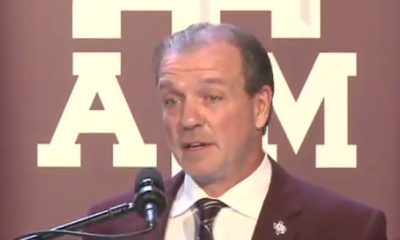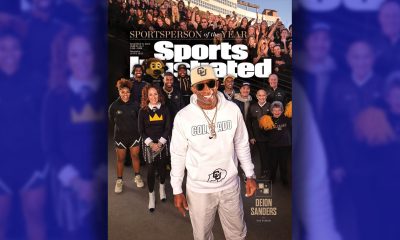Sports
Off-Field Scandals Don’t Hurt Recruiting for FSU, UNC

Florida State head coach Jimbo Fisher speaks to members of the media during an NCAA college football media day on Sunday, Aug. 10, 2014, in Tallahassee. (AP Photo)
AARON BEARD, AP Sports Writer
Off-the-field scandals at Florida State and North Carolina didn’t seem to hurt the schools’ recruiting efforts.
The Seminoles have spent the past year making headlines about legal troubles of several players, most notably Heisman Trophy-winning quarterback Jameis Winston. Ugly questions have hovered even longer over North Carolina over a long-running academic fraud scandal.
And yet, Florida State unveiled the top class in the Atlantic Coast Conference on national signing day Wednesday, while the Tar Heels put together a top-30 class.
FSU coach Jimbo Fisher and school officials were criticized for failing to discipline top athletes for off-field behavior. Winston was accused of sexual assault in December 2012 but was never charged.
The Department of Education is investigating how FSU handles possible Title IX violations in the wake of the Winston case, namely in how it responds to sexual violence complaints.
But Fisher said the program’s handling of some of those issues turned out to be a positive in recruiting.
“Parents respected that we didn’t cave to pressure and we didn’t cave to media and we didn’t cave to public opinion,” Fisher said. “You can’t worry about what other people try to bully you into doing.”
Meanwhile at UNC, the school has been dealing with an academic fraud case that an independent investigator reported spanned more 18 years and involved more than 3,100 students — roughly half being athletes. The NCAA reopened its investigation into academic misconduct last summer.
Coach Larry Fedora said other schools constantly used it against UNC in recruiting.
“There was never a situation where we were trying to hide what was going on,” Fedora said. “… In each of those cases, it was continually brought up to them so we always had to go back and re-address it.”
Louisville turned into the school of second chances on signing day. Coach Bobby Petrino, who returned to the university after falling from grace at Arkansas and a one-year stop at Western Kentucky, signed outside linebacker Devonte’ Fields.
Fields was the Big 12 Conference’s 2012 Defensive Player of the Year as a TCU freshman, but was dismissed before last season after his ex-girlfriend accused him of assaulting her and threatening her with a gun. He was arrested on a misdemeanor assault warrant in July and posted a $3,500 bond.
Said Petrino: “We felt comfortable that, No. 1, there was absolutely no gun there, and that it’s a misdemeanor charge.”
___
Here are things to know about national signing day in the ACC:
BEST CLASS: Florida State ranked third nationally by Rivals and No. 11 by Scout. Still, the Seminoles missed on making this haul even better, including losing defensive back Iman Marshall to USC. Clemson had the league’s second-best recruiting class, peaking at No. 4 nationally according to Rivals.
IMPACT PLAYER: Devonte’ Fields certainly has the chance to make a big impact at Louisville if he can stay out of trouble. He spent a season at Trinity Valley Community College ranked by Scout as the nation’s No. 2 junior college player.
PLAYER TO WATCH: Defensive tackle Christian Wilkins enters a good situation at Clemson. The five-star prospect, ranked as the nation’s No. 4 player at his position by Rivals, joins a Tigers team that lost six members from its front seven, including star Vic Beasley. That sets up the 6-foot-5, 305-pound recruit from Connecticut’s Suffield Academy with the opportunity to find a role quickly.
SOLID SHOWING: North Carolina’s list of problems — from a miserable defensive season to the NCAA investigation — didn’t stop the Tar Heels from putting together a solid class. The 19-player class ranked 24th nationally according to Scout and 28th according to Rivals.
TOUGH DAY: A coaching change didn’t help Pittsburgh, which ranked last in the ACC at No. 72 nationally according to Rivals and near the bottom among league teams at No. 63 on Scout. New coach Pat Narduzzi had fewer than six weeks to put together a 15-player class after Paul Chryst left to take over at Wisconsin.
___
Follow Aaron Beard on Twitter at http://www.twitter.com/aaronbeardap
Copyright 2015 The Associated Press. All rights reserved. This material may not be published, broadcast, rewritten or redistributed.
Business
Sacramento Kings and Black-Owned Digital License Plate Firm Enter History-Making Partnership
Reviver founder and Chief Strategy Officer Neville Boston attended the Sacramento Kings’ season opener at Golden 1 Center, witnessing players debut the company’s patch. Reviver proudly supports the Sacramento Kings’ community and diversity, equity, and inclusion initiatives. Photo by Antonio Ray Harvey, California Black Media (CBM).

By Antonio Ray Harvey, California Black Media
Reviver, the world’s first digital license plate and connected vehicle platform, has entered into a history-making jersey patch partnership with the Sacramento Kings, team officials announced right before the team’s season opener on Oct. 24.
The collaboration establishes Reviver as the first Black-founded technology jersey patch partner in the National Basketball Association (NBA).
The Reviver logo now appears on the left front strap of Kings’ uniforms.
Reviver founder and Chief Strategy Officer Neville Boston was in attendance to see the company’s patch worn by the Kings, during a game with the Minnesota Timberwolves at Golden 1 Center in downtown Sacramento.
“It was an absolutely amazing night. More than I ever expected,” Boston told California Black Media (CBM). “The Sacramento Kings have been incredible. On a national, and maybe a worldwide level, this partnership raises the profile of Reviver with the assistance of (Kings chairman and CEO) Vivek Ranadivé and the Kings.”
According to the Kings’ brass, Reviver, supported by the Black Star Fund, a Black-led venture capital firm based in Sacramento, is now an official “innovation partner” of the Kings and Golden 1 Center; a presenting partner of “Capitalize Technology,” a King’s corporate social investment initiative; and the exclusive digital license plate of the Sacramento Kings.
Headquartered in Granite Bay, a suburb of Sacramento, Reviver was born from a vision to modernize and streamline the vehicle registration renewal process. On Jan. 1, 2023, the state of California joined Georgia, Colorado, Michigan, and Arizona as states that have approved digital license plates for use statewide, after Reviver completed a four-year pilot program that evaluated a replacement for metal plates.
About 10,000 California drivers bought digital plates during the pilot program. Vehicles registered with the state are eligible to adopt the new high-tech tags. Reviver existence was made possible when Gov. Gavin Newsom signed Assembly Bill (AB) 984 in September 2022.
Under that law, California vehicle owners can update their titles, registrations, and other records remotely. In addition, the digital license “RPlate” includes a flashing message if a vehicle is reported stolen or if there is an Amber Alert.
Ranadivé is spreading the news that Reviver has international potential.
“This jersey patch partnership with Reviver continues the Kings long tradition of using our global platform to promote innovation and technology,” Ranadivé stated. “It’s particularly exciting to showcase a homegrown company that was part of our Kings Capitalize program. This is just the beginning of our work together, and we look forward to helping Reviver in its mission to modernize the driving experience.”
The commercial use of patches in professional basketball all began in 2009 when the Women’s Basketball Association (WNBA) Phoenix Mercury removed its name to replace it with sponsor, LifeLock, an identity-theft protection company. The landmark deal netted a contract worth about $1 million annually.
Kindra Montgomery-Block, vice president of diversity, equity, and social impact for the Sacramento Kings, was the integral facilitator who assisted Boston and his team in connecting with the sports franchise that is boasting 40 years in the Capital City.
“This partnership between the Kings and Reviver, backed by the Black Star Fund, will invest in the Sacramento community to promote technology and innovation in the region,” Montgomery-Block stated. “Reviver will support the Sacramento Kings community and diversity, equity, and inclusion initiatives.”
Editor’s Note: Neville Boston is a California Black Media board member.
Black History
Martial Artist Victor Moore: An American Karate and Kickboxing Pioneer
Throughout his career, Moore defeated many national champions, including Joe Lewis, Mike Stone, and Bill “Superfoot” Wallace. Moore placed in every tournament he competed in from 1965 until his retirement in 1975, defeating renowned national champions such as Mike Foster, Chuck Norris, Fred Wren, Glenn Keeney, James Hawkes, and Jim Kelly. Moore emphasizes that winning or losing does not diminish a champion’s credibility — they are all champions in his eyes.

By Tamara Shiloh
Victor Moore, born on Aug. 23, 1943, holds a 10th-degree Black Belt in Karate and is a four-time world karate champion.
As one of the chief instructors under Robert Trias in the Shuri-ryu Karate system, Moore was also among the first ten members of the Trias International Society. Over his 50-year martial arts career, he trained in various styles, including Chito-ryu with William J. Dometrich, Judo, Kempo, and Bondo karate.
Moore began his martial arts journey at the age of 7 in Cincinnati, lifting weights and reading Charles Atlas books to guide his training. By age 9, he had learned the basics of jujitsu and judo, and at 12, he began training in Kempo karate under Ronald Williams, who awarded him his first black belt after five years of instruction.
In 1961, Moore expanded his training by joining a judo school led by Ray Hughes and later trained in Gyu Ryu-karate under Harvey Eubanks. He studied Kempo with Bill Dometrich and continued exploring different karate styles. Instructors at the time, required students to start as white belts in each new style, even if they held black belts elsewhere, which shaped Moore’s adaptability.
Chung Ling, an exchange student from China, introduced Moore and others to Chuan Fa, enhancing Moore’s understanding of martial arts. He also took up judo at a school in Cincinnati, where he earned his brown belt, and trained in karate with Jim Wax, who had studied under the Shimabuku brothers. Moore’s toughness was further honed by his boxing experience at the 9th Street YMCA, where he became a sparring partner for Tiger Joe Harris.
At Central State University, Professor Barry Yasuto trained Moore in Shotokan karate, but Moore was denied entry to the Japanese Karate Association, possibly due to his race. After returning to Cincinnati, Moore opened his first karate school and began competing in national tournaments. He traveled across the U.S., eventually meeting Robert Trias, who became his mentor and helped him rise to the second-degree black belt level. Under Trias, Moore continued training in Kempo and Goju-Ryu styles.
Moore also trained under Dr. Maung Gyi, learning Bondo karate, stick fighting, and kickboxing. In 1973, Moore and Joe Lewis introduced kickboxing to America on the Merv Griffin TV show. Moore competed in the first kickboxing tournament in the U.S., facing Jim Harrison in a historic fight.
Throughout his career, Moore defeated many national champions, including Joe Lewis, Mike Stone, and Bill “Superfoot” Wallace. Moore placed in every tournament he competed in from 1965 until his retirement in 1975, defeating renowned national champions such as Mike Foster, Chuck Norris, Fred Wren, Glenn Keeney, James Hawkes, and Jim Kelly. Moore emphasizes that winning or losing does not diminish a champion’s credibility — they are all champions in his eyes.
Moore continues to teach martial arts, working with instructors and students nationwide. His daughters, Vickie and Vonnie, and his son, Vanceston, also train under his guidance.
Bay Area
Cal State East Bay Athletic Department Holds Hall of Fame Gala
The university honored exceptional athletes, teams, and coaches at their annual celebration before 200 guests. The Class of 2024 included the 1999-2000 Pioneer Softball Team that won the Cal Pac Championship in 2000 and went on to win the first two games of the NAIA Region II Playoffs and combined 32-3 in CalPac over the two seasons.

By Carla Thomas
California State University East Bay Athletics (CSUEB) hosted their 2024 Pioneer Hall of Fame Gala at the Pioneer Gymnasium in Hayward on Saturday, Oct. 19.
The university honored exceptional athletes, teams, and coaches at their annual celebration before 200 guests.
The Class of 2024 included the 1999-2000 Pioneer Softball Team that won the Cal Pac Championship in 2000 and went on to win the first two games of the NAIA Region II Playoffs and combined 32-3 in CalPac over the two seasons.
The 1999 CalPac Player of the Year was Pioneer Hall-of-Famer Danielle Stines and also on the 1999 team was Pioneer Hall-of-Famer Angel Alcorcha.
In 2000, the Pioneers swept the premier CalPac Awards, and Rachel Abrams was named Player of the Year, Christy Smith was named Pitcher of the Year, and Karen Lee Yoder (Matteson) was named Coach of the Year. Their team record for batting average in 1999 still stands after 25 years with an amazing combined .347.
Lorenzo Hall of CSUEB’s Men’s Basketball Team 1986-1990 was recognized for his achievements as a two-time All-NCAC selection, ranking in the top-10 in program history for assists, steals, free throw percentage and scoring.
At the time of his graduation, Hall held NCAC records for assists and steals. He also served as an assistant coach for the Pioneers after his playing career and created the nonprofit First Step Basketball to guide the next generation of young athletes.
Inductee and Women’s Gymnastics Coach Dorie Krepton of 1971-1985 led the team through winning 145 of 171 meets, 84% of their competition.
Through her 14 years of leading the Pioneers, Krepton coached the program to five Golden Gate Conference Championships, and the team qualified and participated in six NCAA Gymnastics National Championships. She also coached 10 All-American Athletes, including Pioneer Hall of Famers Holly Moore Leonard and Janet Kramer.
The seven-time Coach of the Year honoree served as Kinesiology and Physical Education professor emeritus at Cal State East Bay, which offered a degree option in exercise nutrition in the Kinesiology Department.
Bob Olsen of the CSUEB Men’s Track and Field Team, 1976-1979, was a member of 1977 NCAA Division II National Championship team and the two-time Far Western Conference Champion in pole vault, 1978 and 1979. Olsen was a four-time All-Conference selection and in 1976, Olsen became the first freshman pole vaulter in Division II to clear 16 feet.
Olsen was in the top 10 in the pole vault at the NCAA Division II Championships four times in his career.
Honoree Kulwant Singh served as the men’s and women’s assistant soccer coach from 1983-1990. The women’s team won six straight conference championships from 1984 to 1989. Singh served on the coaching staff alongside Pioneer Hall of Famer Colin Lindores.
In 1985, Singh coached the women’s team to an undefeated regular season (18-0) and lost to UC Santa Barbara on a golden goal in the NCAA playoffs. Singh was assistant coach for the 1988 NCAA Division II Women’s Soccer Championship team and helped the 1989 men’s soccer team reach the NCAA Division II Championship semifinals.
Singh also played on the pitch as a Pioneer before coaching in Hayward and currently serves as commissioner for the Central Valley Conference.
The inductees also participated in several days of alumni activity, beginning with Pioneer Alumni Day on Thursday, Oct. 17.
With the addition of the new members, the Pioneers Hall of Fame now features 119 individuals and four teams.
During sports seasons, the Pioneer Gymnasium is open to the public, and guests can view the school’s Hall of Fame Wall.
-

 California Black Media4 weeks ago
California Black Media4 weeks agoCalifornia to Offer $43.7 Million in Federal Grants to Combat Hate Crimes
-

 Black History4 weeks ago
Black History4 weeks agoEmeline King: A Trailblazer in the Automotive Industry
-

 California Black Media4 weeks ago
California Black Media4 weeks agoCalifornia Department of Aging Offers Free Resources for Family Caregivers in November
-

 California Black Media4 weeks ago
California Black Media4 weeks agoGov. Newsom Goes to Washington to Advocate for California Priorities
-

 Activism3 weeks ago
Activism3 weeks agoOakland Post: Week of November 27 – December 3, 2024
-

 Activism4 weeks ago
Activism4 weeks agoOCCUR Hosts “Faith Forward” Conference in Oakland
-

 Activism4 weeks ago
Activism4 weeks agoRichmond Seniors Still Having a Ball After 25 Years
-

 Activism2 weeks ago
Activism2 weeks agoButler, Lee Celebrate Passage of Bill to Honor Congresswoman Shirley Chisholm with Congressional Gold Medal

























































